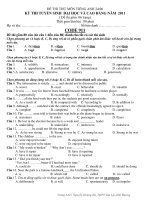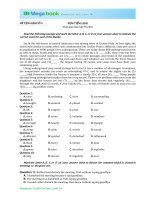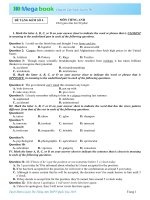Đề thi thử môn Tiếng Anh (3)
Bạn đang xem bản rút gọn của tài liệu. Xem và tải ngay bản đầy đủ của tài liệu tại đây (134.4 KB, 5 trang )
46
TEST 10
Part 1: Phonetics:
Choose the word whose underlined part is pronounced
differently from the rest in each group
451. A. invite B. time C. imitate D. kind
452. A. state B. statue C. station D. stay
453. A. coughed B. missed C. watched D. visited
454. A. runaway B. agree C. relaxed D. accept
455. A. betray B. bed C. belt D. bend
Choose the word whose syllable is stressed differently from
the rest in each group
456. A. pattern B. forest C. heading D. heating
457. A. chocolate B. difference C. identity D. vegetable
458. A. supermarket B. photography C. federation D. personality
459. A. normal B. careless C. worried D. engaged
460. A. begin B. promise C. furnish D. invent
Part 2: Vocabulary grammar and structures
Choose the best answer among A, B, C or D
461. "I don't want to buy anything, do you?" "Yes, I'd like to
buy_____"
A. pencil B. much pencils C. any pencils
D. some pencils
462. Your explanation_____ reasonable.
A. is not sound B. does not sound C. is
not sounded D. is not sounding
463. ____ the hotel rooms are reserved throughout peak season.
A. Almost B. Almost of C. Almost all of D. Most of
all
464. "Where did you work before?" "I worked only minutes_____
railroad track".
A. from B. from the C. near D. away
465. "I don't think it will rain at all today, do you?" "No, I
_____ so".
A. think not B. not think C. don’t think D. do think
not
466. We have only another five minutes. I think we_____
A. hurry B. be hurry C. to hurry D. should
hurry
467. Many fans showed up at the stadium. They were _____ the
big game.
47
A. anxious seeing B. anxious to see C. to
anxiously see D. to see anxiously
468. "John isn’t sure that the meeting will be held tomorrow".
"But I _____"
A. certain B. certainly C. am certain D. am
certainly
469. My brother loves to watch besaball; I_____ basketball
A. prefer to watch B. to prefer watching C. watch
preferring D. preferring to watch
470. I think our guests will_____
A. be here shortly B. shortly be here C. here
be shortly D. here shortly be
471. Who _____ when John is likely to turn up.
A. know B. do know C. is knowing D. knows
472. The managers are_____ a new work schedule now.
A. arranging B. arranging up C. be arrange
D. to arranging
473. The smiths will move to New York. But we hope to _____
with them.
A. keep touch B. keep at touch C. keep on
touch D. keep in touch
474. Ann is very temperamental. How do you_____ her?
A. put up with B. put with C. put up to D. putting up
with
475. My parents often_____ after dinner.
A. go for a walk B. walking C. go a walk
D. go to walking
Which sentence expresses the same idea as the given one?
476. I don't remember that I met him in London.
A. I remember not meeting him in London B. I remember
to meet him in London
C. I remember meeting him in London D. I don't
remember meeting him in London
477. You are not allowed to smoke here
A. you can smoke here if you like C. smoking is
allowed here
C. smoking is banned here D. all are correct
478. There're many people who don’t know anything about
protecting the environment.
A. Many people aren't aware of protecting the environment.
B. Many people have no knowledge of protecting the
environment.
C. Many people don't know how to protect the environment.
D. Many people know much about protecting the environment.
48
479. Mt. Everest is the highest mountain in the world. It's in
the Himalayas.
A. Mt. Everest, the highest mountain in the world, is in
the Himalayas.
B. Mt. Everest is the highest mountain in the world, it's
in the Himalayas.
C. Mt. Everest is the highest mountain in the world, is in
the Himalayas.
D. Mt. Everest is the highest mountain in the world, in the
Himalayas.
480. The Pikes say: "We're going to spend our holiday in
Dalat".
A. The Pikes say (that) we're going to spend our holiday in
Dalat.
B. The Pikes say (that) we're going to spend their holiday
in Dalat.
C. The Pikes say (that) they're going to spend our holiday
in Dalat.
D. The Pikes say (that) they're going to spend their
holiday in Dalat.
Choose a word or phrase in each sentence that needs correcting
481. I look (A) forward (B) to see you (C) on Tuesday (D)
after work.
482. I (A) didn't see (B) someone (C) on the way (D) to your
house.
483. It is (A) sure that (B) one day she will (C) pass (D) her
examinations.
484. I don’t (A) think I have (B) ever (C) red one of his (D)
books.
485. I (A) never have been (B) to see that film (C) at (D) the
local cinema.
Part 3: Reading
Read the passages below and choose the correct answer among A,
B, C or D.
CARS
Motor cars are the dream that could ultimately become the
nightmare of the 21st century. The machines that once
liberated rich people have become essential for millions. They
have also sentences the present generation to the frustration
of neverending journeys that would shock the pioneers of
Britain's biggest single industry.
Cars have allowed millions to travel enormous distances
for business and holidays cheaply and quickly. But the rapid
49
growth in motoring has condemned us all to neurosis, not only
over the time wasted in traffic jams, but also over pollution.
That is why noise illnesses and destruction caused through
pollution, road building, and the making of cars have made
transport a major concern for the millennium.
Britain's motor industry today employs a million people.
However the industry which has shown such brilliant
inventiveness over the century now faces its biggest
challenge: to ensure a future of growth without pollution. The
problem facing Britain is that millions rely on the car
because there is no viable alternative.
After 100 years, what is the future of the car? We have
asked the experts, now let us know what the ordinary motorist
thinks.
486. Why do a lot of people use the car nowadays?
A. Because it has liberated millions of people.
B. Because we have the frustration of traffic jams.
C. Because a lot of people work making cars and they have
to see them.
D. Because it has become a cheap way of traveling and we
don't have an alternative.
487. In what sense does traffic affect people?
A. It has advantages and disadvantages. B. It has no
other alternative for the British
C. It kills people in car crashes D. It creates
pollution and makes people anxious
488. What are the most remarkable features of Britain's motor
industry?
A. It is not a very important industry in that country.
B. A lot of people work there but it may have problems in
the future.
C. It creates pollution and new roads cause the destruction
of forests.
D. It makes cheap and fast cars.
489. Find in the text the word which has the following
definition: "Situation in which there are so many vehicles
that they move very slowly or not at all".
A. traffic B. traffic jam C. pollution D. transport
490. Find on e synonym in the text for FAST
A. present B. wasted C. enormous D. quickly
WALKING IN THE COUNTRY
50
I enjoy walking. It's good exercise and it get me
(41)_______ the town and into the country.
I think that's (42)_______ I have a dog. She needs
(43)_______ out and so I have a reason to go for a walk. I go
every Sunday and it doesn't (44)_______ to me if it's cold,
windy and raining or a beautiful sunny day. I just love to get
away from people and be (45)_______ for a few hours.
I always (46)_______ home at the same time every Sunday and
walk over the hills to a little village in the country. The
walk isn't very (47)_______ only about an hour, but it's quite
hard work because I have to walk up the hill and down the
other side.
(48)_______ I get to the village, I go to the pub for a
beer and (49)_______ food. After lunch, I walk back along a
(50)_______ path and arrive home in time for tea.
491. A. to B. from C. out of D. out
492. A. that B. what C. why D. for what
493. A. going B. that we go C. to go D. go
494. A. worry B. matter C. trouble D. bother
495. A. alone B. lone C. sole D. lonely
496. A. leave B. go C. depart D. set off
497. A. extended B. long C. far away D. lengthy
498. A. On B. As C. By D. When
499. A. a B. the C. some D. any
500. A. separated B. another C. different D. other
1. c 2. b 3. d 4. c 5. a 6. d 7. c 8. b 9. d 10. a
11. d
12. b
13. c
14. b
15. c
16. d
17. b
18. c
19. a
20. a
21. d
22. a
23. d
24. a
25. a
26. d
27. c
28. b
29. a
30. d
31. b
32. b
33. c
34. c
35. a
36. d
37. d
38. c
39. b
40. d
41. c
42. c
43. c
44. b
45. a
46. a
47. b
48. d
49. c
50. c









